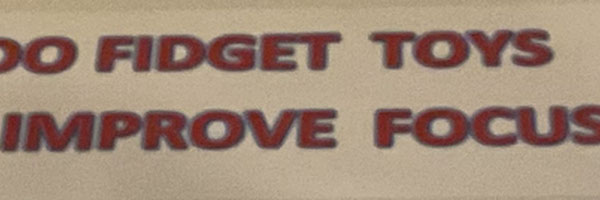Can fidgets help you focus
Grade 6
Presentation
No video provided
Hypothesis
We hypothesize that individuals will work faster and exhibit better focus when using fidget tools compared to not using fidget tools.
Research
-
There are different types of fidgeting, for example foot tapping, hair twirling, nail biting or crinkling a candy wrapper.
-
Fidget toys can assist in managing individuals' behavior and attention, thereby promoting active listening.
-
Experts believe that fidgeting can enhance our learning because it helps redirect our attention.
-
Fidget toys can bring our attention back to the task at hand and allows us to focus better, relieve nervous energy, reduce anxiety and physical stress, ultimately improve our learning ability.
-
Most children learn best when their hands are active, as it increases their energy levels and enables them to focus better while trying to learn.
-
Fidget toys can assist in engaging both the right and left sides of the brain, which are crucial for learning. Studies indicate that using a fidget ball can stimulate these areas through movement and sensory input.
-
Using fidget tools led to a 10% improvement and students diagnosed with ADHD showed 27% improvement. The studies show that fidget tools help all students, especially students with learning disabilities, to learn better.
-
Variables
- The way the participant play and hold the fidget ball.
- The room and the lighting conditions
- The size of the fidget ball
- How they hold the fidget balls
- Time of day doing experiment
- The Experiment area or setting
Procedure
Experiment 1 :
- Finding individuals to participate in the experiment
- Direct participants to sit in a comfortable area with a table.
- Providing guidance on how to conduct our experiment.
- Hand out 30 easy one-digit multiplication problems without a fidget tools.
- Start the timer and set the duration up to 5 minutes to complete.
Experiment 2:
- Continue with the same set of participants from Experiment 1
- Instruct participants to flip the sheet of math paper.
- Start the another 30 easy one-digit multiplication problems, this time allowing the use of a fidget balls.
- Start the timer and set the duration up to 5 minutes to complete.
- Tell the participants to answer the extra questions below.
Observations
Analysis
- We noticed that our school peers and Winter Club Kids tend to focus better with using a fidgets. The average time difference using a fidgets was 5 second less compared to using a fidgets.
- We also observed an increase in focus among adults from the Winter Club when using fidgets, leading to an average time improvement of 10 seconds.
- 62% of our sample said that they like to use fidget tools.
- 51% of our sample mentioned that fidget tools help them focus well.
- Despite this, 73% of our sample do not fidget when they are studying/working.
Conclusion
In our experiment, the hypothesis was supported as 25 children demonstrated that the average time for completing 30 multiplication questions using a fidget ball was 1 minute and 33 seconds, whereas without using a fidget ball it was 1 minute and 38 seconds. This shows that children using fidget balls are faster by 5 seconds compared to those not using fidget balls.
We also conducted the experiment on adults, and it further supported our hypothesis. The average time for adults using a fidget ball was 54 seconds, while the average time without using a fidget ball was 1 minute and 4 seconds. This indicates that adults using a fidget ball are faster by 10 seconds.
In our experiment, we also graded the worksheets, and it did not impact our results.
Application
- Schools should allow the use of fidgets as research shows that these tools are not a distraction.
- Fidgets should be looked as a resource to help reduce anxiety and increase attentiveness in schools and workplaces.
Sources Of Error
- We had a small sample size
- Some kids quit halfway through and skipped some questions
- Not all kids play with the fidgets
- Some kids have different skill levels in multiplication
- Different age group
- Some kids did not take the experiment seriously
- Depends on whether they start the math questions using or without using a fidget ball.
Citations
- Welch, Heather. “How Do Fidget Toys Help? – Edx Education.” Edx Education, 16 March 2022, https://edxeducation.com/how-do-fidget-toys-help/
- Hinck, Michael. “Can Fidget Toys Help Your Child's Ability To Focus? - Health Beat.” Flushing Hospital Medical Center, 13 April 2017, https://www.flushinghospital.org/newsletter/can-fidget-toys-help-your-childs-ability-to-focus/
- Ismail, Nabila. “Your Guide To Fidget Toys For Anxiety – Forbes Health.” Forbes, 9 March 2023, https://www.forbes.com/health/mind/fidget-toys-for-anxiety/“How Can Fidget Toys Help Students Learn?” School Health, 21 November 2022,
- https://www.schoolhealth.com/blog/how-can-fidget-toys-help-students-learn/
- Wimmer RD, Schmitt LI, Davidson TJ, Nakajima M, Deisseroth K, Halassa MA. Nature. 2015 Oct 29;526(7575):705-9. doi: 10.1038/nature15398. Epub 2015 Oct 21. PMID: 26503050.
- Aspiranti, Kathleen, and David Hulac. “Mapping brain circuits involved in attention.” National Institutes of Health (NIH), 2 November 2015, https://www.nih.gov/news-events/nih-research-matters/mapping-brain-circuits-involved-attention.
- Purdy, Brett, and Rachel Cave. “Tool or toy? Why fidget toys may be hurting as many kids as they help.” CBC, 7 May 2017, https://www.cbc.ca/amp/1.4099722.
- Isbister, Katherine. “Fidget Toys Aren't Just Hype.” Scientific American, 18 May 2017, https://www.scientificamerican.com/article/fidget-toys-arent-just-hype/.
- Rotz, Roland, and Sarah Wright. “ADHD Fidgeting Builds Focus: Body-Brain Connections.” ADDitude, 15 February 2024. 2024 https://www.additudemag.com/focus-factors/amp/.
Acknowledgement
Winter club management
Miss Bounds
Miss Krista
Miss Caitlin
Angie’s mom/dad
Abdullah's mom/dad

